CLiF has served over 350,000 children since 1998.
Community Literacy Conference Workshops & Presenters
Workshop Block 1: 12:45-1:45 PM
The Whole Book Approach Meets Critical Literacy
Presented by Megan Dowd Lambert and Dr. Breanna J. McDaniel
This session examines a range of diverse picture books, including several written by Dr. Breanna J. McDaniel, by drawing on critical literacy (Freire and Macedo 1987)[1] skills. Connecting those skills with Whole Book Approach methodology (developed by Lambert in association with the Eric Carle Museum of Picture Book Art), we will consider how storytime conversations about art and design can give way to children’s responses to picture-book characterization—particularly regarding representations of race and other aspects of identity. Together we will explore:
- inclusive book selection and collection development as acts of social justice
- holding space at storytime for children to engage in brave, empowering discussions about race and other aspects of identity
- helping readers resist stereotypes and bias in texts
- and how reading can lead to action and change
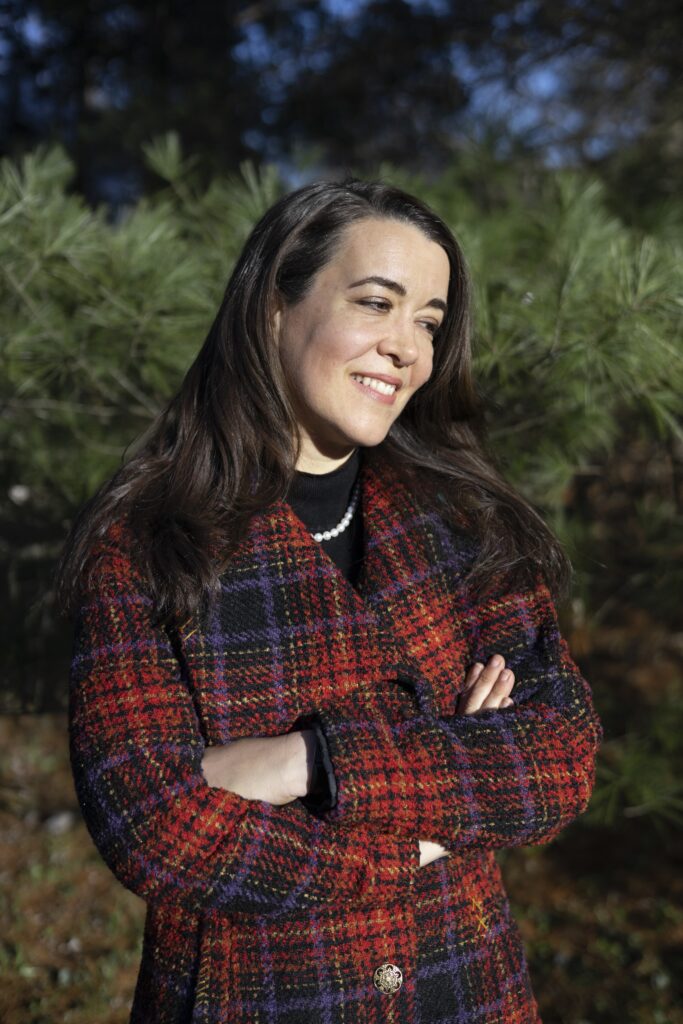
Megan Dowd Lambert (B.A. Smith College, M.A. Simmons University) is the creator of The Whole Book Approach storytime model, which she developed in association with The Eric Carle Museum of Picture Book Art. After working as an educator at The Carle for over a decade, she held contract faculty appointments in Children’s Literature at Simmons University until 2020. She won an Ezra Jack Keats New Writer Honor for her first picture book, A Crow of His Own, illustrated by David Hyde Costello (Charlesbridge 2015), and is the author of many other children’s books, including the Every Day with April & Mae early reader series, illustrated by Briana Dengoue and Gisela Bohórquez (Charlesbridge 2022, 2023). Megan’s books for adults include Reading Picture Books with Children: How to Shake Up Storytime and Get Kids Talking About What They See (Charlesbridge 2015); Book Bonding: Building Connections Through Family Reading , illustrated by Mia Saine (Charlesbridge 2023); and Read It Again: 70 Whole Book Approach Plans to Help You Shake Up Storytime (White Poppy Press, 2023). In addition to ongoing work in children’s literature, Megan is president of Modern Memoirs, Inc., a private publishing company that specializes in memoirs and family histories, where her current writing projects focus on exploring her Franco and Irish American roots and her faith heritage. The mother of seven children ages 7–27, Megan grew up in Vermont and now lives with her family in western Massachusetts. Readers can find her online at www.megandowdlambert.com and www.modernmemoirs.com.
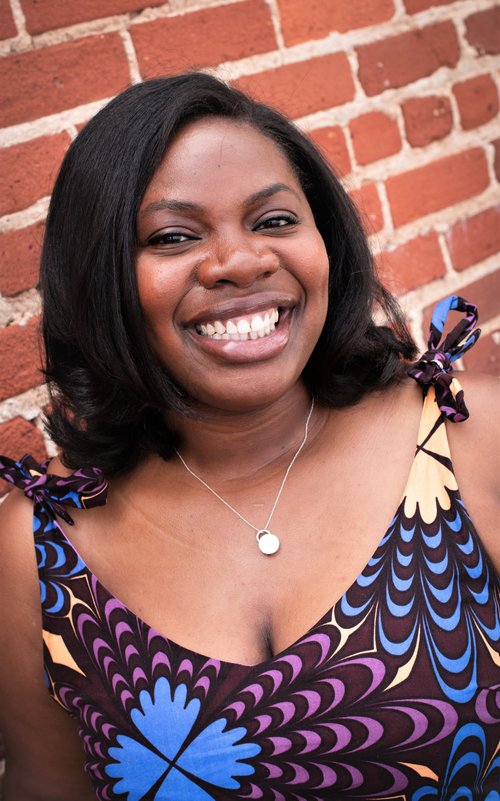
Dr. Breanna J. McDaniel (she/her/hers) is an emerging creative and recovering scholar. She’s published in myriad academic journals, an academic anthology, and her debut picture book Hands Up! was published with Dial Books in 2019. She is also the author of other picture books, including Atlanta, My Home and Impossible Moon which was published with Denene Millner Books/ Simon and Schuster.
Her newest book with Penguin Random House’s imprint Dial Go Forth and Tell: The Life of August Baker, Librarian and Master Storyteller, was published February 6, 2024 and has received five starred reviews. Her fifth picture book Cute Toot was published in April 2024 and she also has two more picture books with Henry Holt Books for Young Readers at Macmillan.
Breanna is the co-founder of REIYL and completed her PhD at a university in the UK and looked at surveillance in representations of Black children as food. As an activist she is engaged in thinking through access to different types of literacy for families from the Global Majority and she’s adamant about promoting the work and connections of children’s book creators from those communities too. www.breannajmcdaniel.com
[1] Freire, Paulo, and Donaldo P. Macedo. Literacy: Reading the Word & the World. Bergin & Garvey Publishers, 1987.
Workshop Block 2: 2-2:45 PM
Community Mini–Comics Workshop
with Marek Bennett
Unlock the power of mini-comics to develop students’ skills & voices, share their learning, and make new connections with their school community. Award-winning graphic novelist Marek Bennett presents a structured but flexible way for your students to draw, edit, & self-publish original comics about all their favorite curricular topics.
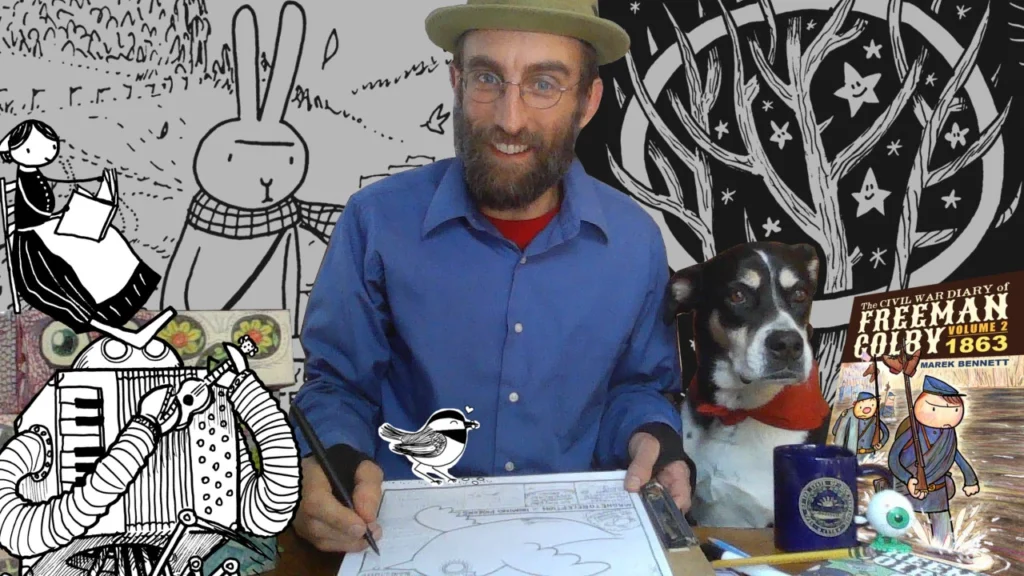
Marek Bennett, M.Ed., is a cartoonist, musician, and educator who leads comics workshops for all ages throughout New England and the world beyond! His graphic novel series, The Civil War Diary of Freeman Colby, features the adventures of a NH school teacher in the Union Army, as well as the stories of the soldiers, nurses, writers, and refugees from slavery during the year 1863. The first book in the series, The Civil War Diary of Freeman Colby, was named a 2017 Great Graphic Novel for Teens by the Young Adult Library Services Association. Marek is also the author of several comics for the Vermont Folklife Center’s El Viaje project, the graphic novel Slovakia: Fall in the Heart of Europe, and the NH history webcomic “LIVE FREE AND DRAW!” Learn more here: www.marekbennett.com.
Exploring the Artistic Styles and Media of Caldecott Winners and Honors
with Stacy Simonyi
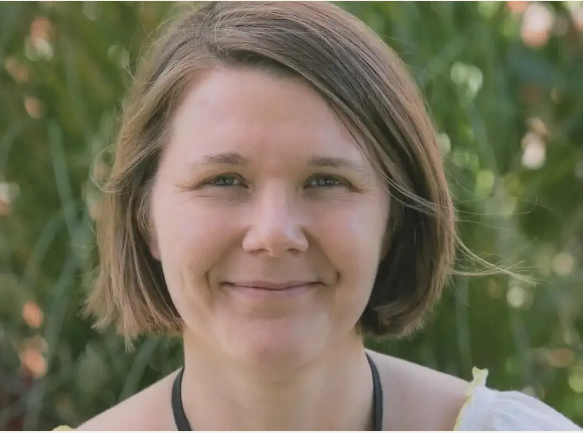
In this hands-on workshop session, participants will explore the artistic media and styles of three Caldecott winners and honors books. First, participants will use a visual thinking strategy to discuss the cover art of the titles, employing critical thinking skills. Following, participants will have the opportunity to mimic the artistic styles used by Caldecott illustrators to create their own artwork and inspire future art-based activities for literacy and learning.
Dr. Stacy Simonyi is currently an assistant professor in the Education Department at Saint Michael’s College in Vermont where she teaches courses in children’s literature, child development, early childhood education, and trauma-informed educational practices. Dr. Simonyi has been a school librarian, academic librarian, reading interventionist, preschool teacher, and elementary teacher.
Using Books as Launchpads for Creativity
with Marv Klassen-Landis
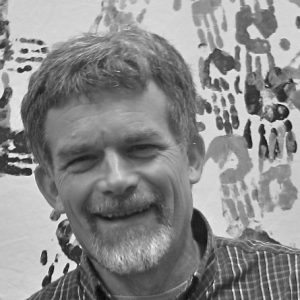
This workshop will explore techniques for incorporating elements of storytelling, theatre, music, poetry and audience participation—before, during and after reading a book together. Storyteller Marv Klassen-Landis will demonstrate how he uses books as launchpads to creativity, inviting you to learn by doing as you participate along the way. While the focus will be on pre-K and early elementary, he adopts many of these methods to working with older students as well.
Marv Klassen-Landis is a storyteller, poet and educator. He has been a CLiF presenter since 2000 and a Vermont Arts Council roster artist since 1990.
New Year of the Book Cohort for 2025-26
with Cassie Willner
This session is only open to incoming Year of the Book coordinators and school members for the 2025-26 cohort. Cassie Willner, CLiF program manager and Year of the Book grant director, will introduce you to the Year of the Book grant including activities, process, and expectations. This is mandatory for new Year of the Book grantees.
